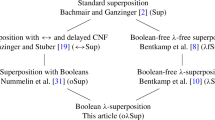Abstract
This paper presents the operating principles of SLOG, a logic interpreter of equational clauses (Horn clauses where the only predicate is ‘=’). SLOG is based on an oriented form of paramodulation called superposition. Superposition is a complete inference rule for first-order logic with equality. SLOG uses only a strong restriction of superposition (innermost superposition) which is still complete for a large class of programs. Besides superposition, SLOG uses rewriting which provides eager evaluation and handling of negative knowledge. Rewriting combined with superposition improves terminability and control of equational logic programs.
Preview
Unable to display preview. Download preview PDF.
Similar content being viewed by others
References
Abramson, H., "A Prological Definition of HASL, a Purely Functional Language with Unification Based Conditional Binding Expressions" New Generation Computing 2:1, pp. 3–35, 1984.
Aida, H., Tanaka, H. & Moto-oka, T., "A Prolog Extension for Handling Negative Knowledge", New Generation Computing 1:1, pp. 87–91, 1983.
Bergstra, J & Klop, J., "Conditional Rewrite Rules: Confluency and Termination" Research Report IW 198/82, Mathematical Centre, Amsterdam, 1982.
Bidoit,M. & Choquer,M.A., "Preuves de Formules Conditionnelles par Recurrence", Proc. AFCET IA, Grenoble, Nov. 1985.
Bouge, L., Choquet, N., Fribourg, L. & Gaudel, M.C.G., "Application of Prolog to Test Sets Generation from Algebraic Specifications", Coll. on Software Engineering, LNCS 186, pp.261–275, March 1985.
Choquet, N., Fribourg, L. & Mauboussin A., "Runnable Protocol Specifications using the logic interpreter SLOG", 5th IFIP Workshop on Protocol Specification, Verification and Testing, Toulouse-Moissac, June 1985.
Colmerauer,A., "Prolog and Infinite Trees", in Logic Programming, K.L. Clark and S.A. Tarnlund (Eds.), Academic Press, 1982.
Deransart, P., "An Operational Algebraic Semantics of PROLOG programs", Proc. Programmation en Logique, Perros-Guirec, CNET-Lannion, March 1983.
Dershowitz,N. & Josephson N.A., "Logic Programming by Completion" 2nd International Logic Programming Conference, Upsala, pp. 313–320, 1984.
Dershowitz, N., "Orderings for Term-Rewriting Systems", TCS 17:3, pp.279–301, 1982.
Durand,J., "LOGRE: un Prototype de Systeme de Programmation en Logique Utilisant des Techniques de Reecriture", These 3eme cycle, U. of Nancy, 1984.
Fay,M., "First-Order Unification in an Equational Theory" Proc. 4th Workshop on Automated Deduction, pp. 161–167, Feb. 1979.
Fribourg, L., "Oriented Equational Clauses as a Programming Language", J. Logic Programming 1:2, pp. 165–177, August 1984.
Fribourg, L., "A Narrowing Procedure for Theories with Constructors", 7th Intl. Conf. on Automated Deduction, LNCS 170, pp. 259–281, 1984.
Goguen, J.A. & Meseguer J., "Equality,Types,Modules and Generics for Logic Programming", J. Logic Programming 1:2, pp. 179–210, August 1984.
Huet, G., "Confluent Reductions: Abstract Properties and Applications to Term Rewriting Systems", J.ACM 27:4, pp. 797–821, Oct. 1980.
Huet,G. & Hullot,J.M., "Proofs by Induction in Equational Theories with Constructors", 21st FOCS, pp. 96–107, 1980.
Hullot, J.M., "Canonical Forms and Unification" 5th Intl. Conf. on Automated Deduction, LNCS 87, pp. 318–334, 1980.
Hussmann,H., "Unification in Conditional-Equational Theories" Technical Report MIP-8502, U. Passau, January 85. Short version in: Proc. EUROCAL 85 Conf., Linz.
Kaplan, S., "Conditional Rewrite Rules", TCS 33, pp. 175–193, 1984.
Kaplan,S., "Fair Conditional Term Rewriting Systems: Unification, Termination and Confluence", Technical Report 194, U. Orsay, November 1984.
Knuth, D.E. & Bendix P.B., "Simple Word Problems in Universal Algebras", in Computational Problems in Abstract Algebra, J. Leech (Ed.), Pergamon Press, New York, pp. 263–297, 1970.
Jouannaud,J.P., Lescanne,P. & Reinig,F. "Recursive Decomposition Ordering", in IFIP Working Conf. on Formal Description of Programming Concepts II, North-Holland, D. Bjorner (Ed.), 1983.
Lankford,D.S., "Canonical Inference", Technical Report ATP-32, Dept of Mathematics, U. of Texas, 1975.
Malachi,Y., Manna,Z. & Waldinger,R.J., "TABLOG: the Deductive Tableau Programming Language", ACM Lisp and Functional Programming Conf., pp. 323–330, 1984.
Naish,L., "automating Control for Logic Programs" Technical Report 83/6, Dept of Computer Science, U. Melbourne, 1984.
Paul,E., "On Solving the Equality Problem in Theories Defined by Horn Clauses" EUROCAL Conf., Linz, 1985 (to appear in LNCS).
Pletat, U., Engels, G., Ehrich, H.D., "Operational Semantics of Algebraic Specifications with Conditional Equations", Proc. 7th CAAP Conf., Lille, France, 1982.
Pereira, F.C.N., Warren, H.D., "Definite Clause Grammars for Language Analysis a Survey of the Formalism and a Comparison with Augmented Transition Networks", Artificial Intelligence 13, pp. 231–278, 1980.
Pereira,L.M., "Logic Control with Logic", 1st Intl. Logic Programming Conf., pp. 9–18, Marseille, 1982.
Reiter, R., "On Closed World Data Bases", in Logic and Databases, H. Gallaire and J. Minker (Eds.), Plenum Press, New York, pp. 55–76, 1980.
Remy, J.L., "Etude des Systemes de Reecriture Conditionnels et Application aux Types Abstraits Algebriques" Doctoral Thesis, J.N.P.L., Nancy, France, 1982.
Remy,J.L., Zang,H., "REVEUR4: A System to Proceed Experiments on Conditional Term Rewriting Systems", Proc. of 2th ECAI Conf., Pisa, 1984.
Slagle, J.R., "Automated Theorem Proving for Theories with Simplifiers, Commutativity and Associativity", J.ACM 21:4, pp. 622–642, Oct. 1974.
Tamaki,H., "Semantics of a Logic Programming Language with a Reducibility Predicate", IEEE Intl. Symp. on Logic Programming, Atlantic City, pp. 259–264, Feb. 1984.
You,J.H., "On the Completeness of First-Order Unification in Equational Theories", unpublished manuscript, 1985.
Author information
Authors and Affiliations
Editor information
Rights and permissions
Copyright information
© 1985 Springer-Verlag Berlin Heidelberg
About this paper
Cite this paper
Fribourg, L. (1985). Handling function definitions through innermost superposition and rewriting. In: Jouannaud, JP. (eds) Rewriting Techniques and Applications. RTA 1985. Lecture Notes in Computer Science, vol 202. Springer, Berlin, Heidelberg. https://doi.org/10.1007/3-540-15976-2_16
Download citation
DOI: https://doi.org/10.1007/3-540-15976-2_16
Published:
Publisher Name: Springer, Berlin, Heidelberg
Print ISBN: 978-3-540-15976-6
Online ISBN: 978-3-540-39679-6
eBook Packages: Springer Book Archive




